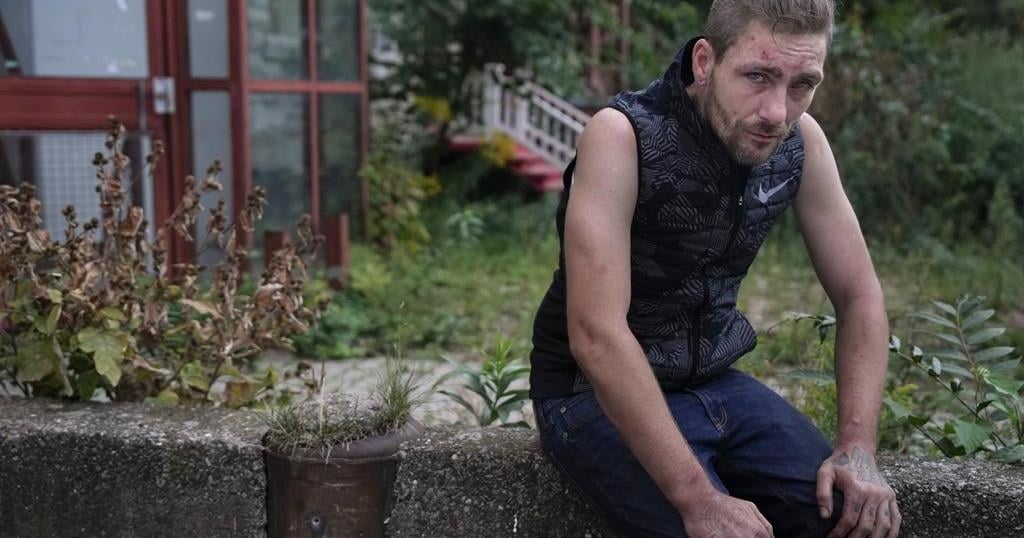TORONTO – Reggie Garrett remembers snippets of the first time he was saved from a fatal overdose.
A few years ago, while at a supervised consumption site in downtown Toronto, he overdosed on fentanyl, with the powerful opioid working to shut down his body.
A staffer rushed to give him an opioid antidote and stood over him while it took effect.
“I saw his face and how worried he was, it was the first time in a long time that I felt like somebody cared about me,” Garrett says.
“I wouldn’t be here if it weren’t for them.”
The 35-year-old weeps as he speaks about the Parkdale Queen West Community Health Centre, which houses the supervised consumption site he uses. It is one of 10 such sites slated for closure after the province announced new rules.
Health Minister Sylvia Jones recently outlined a fundamental shift in the province’s approach to the overdose crisis. Ontario will shutter the 10 sites because they’re too close to schools and daycares, and the government will prohibit any new ones from opening as it moves to an abstinence-based treatment model.
Seven existing consumption sites will remain open.
Jones has denied that the changes would lead to harm, saying “people are not going to die. They are going to get access to treatment.”
But health workers, advocates and those who use the sites say the closures could prove deadly for those with opioid addictions.
Garrett is terrified.
“These people mean the world to me,” he says of staffers at the site he uses. “I’m very alone, but when I come here, I’m not alone anymore.”
The Canadian Press spoke to several people who use supervised consumption sites. Fear, anxiety and confusion dominated those discussions.
For Garrett, using the consumption site has allowed him to trust the health-care workers there, and that has led him to use other services offered at the community centre.
Staffers have even taken him to hospital – in one instance it was because they noticed signs of sepsis that eventually required two weeks of care.
“I guess I’ll end up in a park,” Garrett says of where he’ll use drugs in the future.
For Jeanne Hamilton, the Parkdale consumption site has become a safe haven.
She battled addiction growing up and says she lost many friends to opioids. She started a new life in Toronto after moving from New York but her troubles returned after a difficult pregnancy left her spine in poor shape, leading to nerve damage.
A prescription for opioid-based painkillers following the birth of her child left her hooked again, she says. She later went into a mental spiral after her best friend’s suicide and used fentanyl to cope, she says.
Hamilton eventually ended up using the consumption site and says that after coming to trust the staff, she was able to get herself off fentanyl.
Now on methadone, she’s received training to help others and walks the streets armed with an overdose-reversing naloxone kit.
“I’ve been able to save many, many friends,” the 27-year-old says.
She struggles to find words about the looming changes and worries about relapsing herself.
“I believe a lot of people are going to die because of this decision,” Hamilton says. “I may be one of them.”
The province has said it will be creating 19 new “homelessness and addiction recovery treatment hubs,” plus 375 highly supportive housing units at a cost of $378 million as it enforces its new rules.
But advocates have said that is not enough to meet demand and shuttering consumption sites will cost lives.
The province simply does not understand addicts, says Carmelita Baird-Gendlin.
“I feel like it’s very, very hard for them to empathize with the people like us,” says the 36-year-old.
Baird-Gendlin used to shoot heroin but that drug has largely disappeared from the streets, she says, because of the ubiquity of fentanyl.
“Heroin was enjoyable, but fentanyl, there’s nothing enjoyable about it,” she says. “I keep doing it to avoid being dope sick.”
Justin Smith has been taking fentanyl off and on for years. He was clean and living in Barrie with his fiancée and her three children when he got reacquainted with old friends. He overdosed on drugs he got from them one day, with paramedics rushing to save him.
Smith chose to move out of the couple’s home and stay away from his fiancée’s kids until he got off opioids. That was five years ago.
The 46-year-old says he still sees his partner and the kids weekly, but won’t return until he is sober.
Smith says he had a tough childhood, with his mother using drugs and his father committing crimes.
“My mom was actually the first person I used with,” he says. “My grandmother warned me not to get in touch with my mom because my life would turn out like hers and it totally has.”
He uses several supervised consumption sites because using drugs anywhere else is too dangerous, he says.
“These streets are terrible,” he says.
Smith says he’s been seeing a counsellor at one of the supervised consumption sites, along with a doctor. He’ll be able to get a prescription for medication used to treat opioid addiction when he’s ready, he says.
Angela Robertson, the director of the Parkdale Queen West Community Health Centre, has spent the past two weeks dealing with the worries of both clients and staff.
“We are not just shocked, but frightened for what this will mean for the clients who we have been serving,” she says.
“We feel the decision flies in the face of what has been good public health policy for decades.”
On the health minister’s stance that shuttering safe consumption sites will not cost lives, Robertson says she’d like that to be true but knows otherwise.
“All of the evidence tells me that will not happen,” she says. “In fact, there will be deaths.”
This report by The Canadian Press was first published Sept. 3, 2024.
